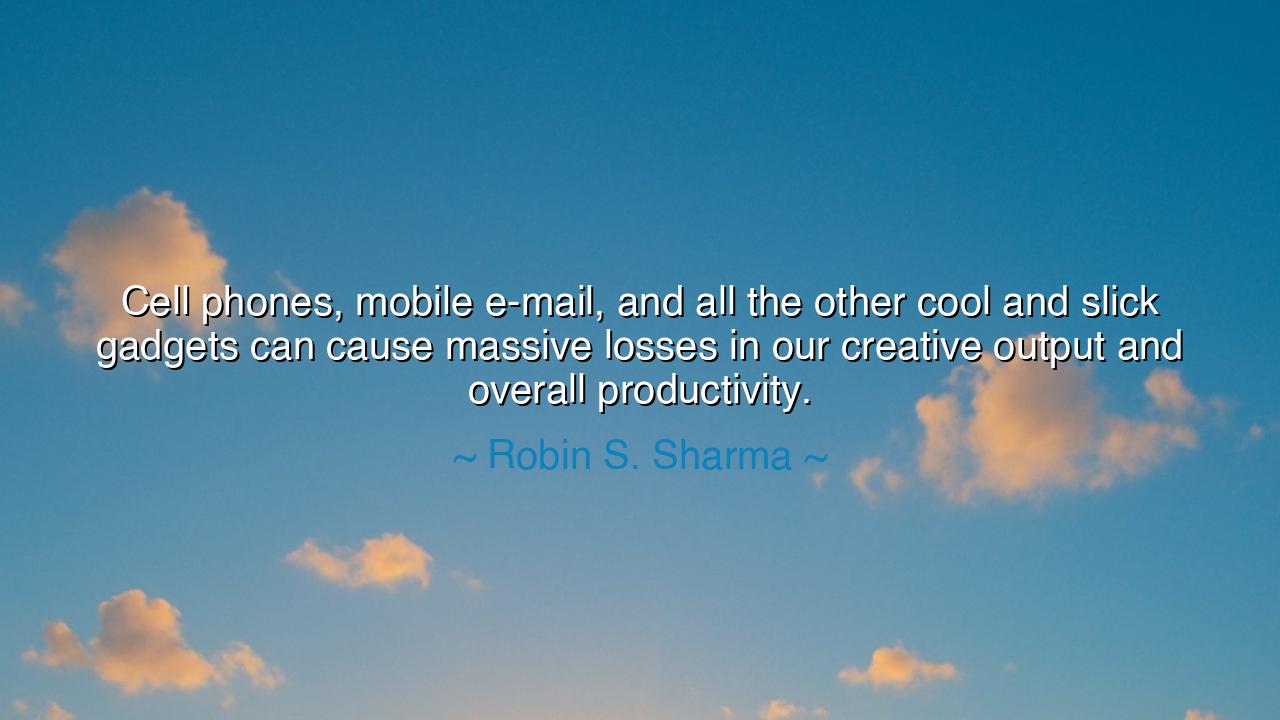
Cell phones, mobile e-mail, and all the other cool and slick
Cell phones, mobile e-mail, and all the other cool and slick gadgets can cause massive losses in our creative output and overall productivity.






“Cell phones, mobile e-mail, and all the other cool and slick gadgets can cause massive losses in our creative output and overall productivity.” Thus spoke Robin S. Sharma, the sage of modern self-mastery, whose voice rings as both warning and wisdom. His words are not a rejection of progress, but a plea for presence—a reminder that the tools we have forged to serve us now threaten to enslave us. In this saying lies a profound truth: that distraction is the new darkness, and the mind, when divided, cannot create, cannot imagine, cannot be.
Sharma, known for his teachings on leadership and mindfulness, wrote these words in an age when humanity was learning to bow before its own inventions. He watched as the once-sacred spaces of silence—those moments when ideas are born—were invaded by the endless hum of notifications. To him, the true danger was not the machine, but the fragmented soul of the one who cannot look away from it. For what use is technology, if it robs us of thought? What value is connection, if it severs us from our own inner life? His warning, therefore, was not against devices, but against dependence—against the quiet death of reflection in a world that never stops speaking.
The ancients understood what we, in our brilliance, have forgotten: that creation is born of stillness. The philosopher retreats into solitude to think, the poet listens to the silence before the song, the inventor walks beneath the stars until a single idea strikes like lightning. Great works are not born amid noise—they arise in the hush of attention. But today, as Sharma laments, we have traded this silence for the ceaseless chatter of the digital realm. Every vibration, every flicker of the screen, calls us away from depth, from patience, from the inner temple of thought. And in answering every call, we abandon the call within ourselves.
Consider the story of Isaac Newton, who, in a time of plague, withdrew from the world and entered into solitude. In that stillness, under the falling apple, he discovered the laws that bind the universe. Had he lived in our age—his mind split by messages, his focus shattered by alerts—would he have heard the whisper of gravity? Or think of Beethoven, who composed not through abundance of sound, but through the silence forced upon him by deafness. In losing the world’s noise, he gained the music of eternity. Such is the paradox: to create deeply, one must sometimes disconnect, not from the world itself, but from its endless distractions.
Sharma’s warning is also moral as much as practical. He asks us to reclaim the discipline of focus, for every moment spent in shallow distraction is a theft from the deeper life. We were not born to live half-attentive, forever scrolling, forever reacting. We were born to build, to dream, to shape reality with imagination and will. Yet creativity, like a delicate flame, cannot survive in the storm of constant interruption. The mind that is always occupied cannot be inspired; the soul that never rests cannot rise.
Let this be a lesson, then, to those who seek meaning in a world of noise: Guard your attention as you would guard your life. Do not be deceived by the glitter of the gadget or the charm of the screen. Set aside hours of sacred stillness—times when no message may reach you, when the mind may wander, reflect, and grow. Walk in nature without a device. Write with your hands, not your thumbs. Speak face to face, not through glass. In this way, you will reclaim not only your time, but your humanity.
For, as Robin Sharma teaches, technology is a servant, not a master. When we forget this order, we lose the essence of who we are—creatures made not for constant reaction, but for deliberate creation. The future will not belong to those who are most connected, but to those who are most conscious. Therefore, seek silence in the storm, focus amid the flood, and remember: the greatest invention of all is not the machine in your hand, but the mind that holds it.
And when you put down the glowing device and listen once more to the quiet beating of your own heart, you will feel again what the ancients knew and what Sharma reminds us—the vast, creative stillness from which all greatness is born.






AAdministratorAdministrator
Welcome, honored guests. Please leave a comment, we will respond soon